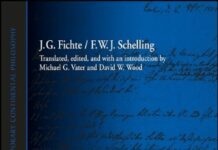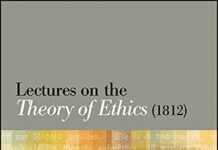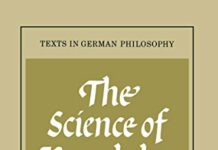
Ebook Info
- Published: 2000
- Number of pages: 380 pages
- Format: PDF
- File Size: 17.73 MB
- Authors: J. G. Fichte
Description
Fichte’s thought marks a crucial transitional stage between Kant and post-Kantian philosophy. Foundations of Natural Right, thought by many to be Fichte’s most important work of political philosophy, applies his ideas to fundamental issues in political and legal philosophy, covering such topics as civic freedom, right, private property, contracts, family relations, and the foundations of modern political organization. This volume offers the first complete translation of the work into English, by Michael Baur, together with an introduction by Frederick Neuhouser that sets it in its philosophical and historical context.
User’s Reviews
Editorial Reviews: Book Description A complete translation into English of Fichte’s most important work of political philosophy.
Reviews from Amazon users which were colected at the time this book was published on the website:
⭐We take freedom for granted, as if it were easily understood and readily actualized. Genuine freedom, and not the empty and abstract ideal of the kind of freedom we presume ourselves to possess automatically, cannot in fact be realized except when a range of conditions are met, including a number of conditions that we might take to be impositions on freedom (such as the existence of laws and police to enforce them). Fichte’s groundbreaking study aims to articulate for the first time, just after the French Revolution, before Hegel or Marx (and even before Kant’s discussion of rights), and of course long before Rawls and others like him who’ve worked on similar problems with varying degrees of insight, the terms in which rights and freedom can properly be understood and actualized in the modern state.It’s a difficult read, but incredibly rewarding for those who approach it in the right way, as a philosophical study of what really must be in place for freedom to be possible, rather than a political treatise on a certain dead guy’s opinions regarding legal principles. Fichte himself marks out the difference in his introduction between reading a text philosophically and reading it idly: in the latter case, you read the text as an outline of something it is possible to think; to read this study philosophically, by contrast, is to read it to discover what you have to think, because its concepts have an object, namely the world we live in articulated in such a way that through these concepts its structure can be seen as if for the first time. In other words, to read a philosophical text like that of Fichte is to rediscover the reality one inhabits, and to grasp it and learn to assess it in ways one hadn’t been able before.The familiar part of the argument is that freedom, considered as the ability to make a difference in the world, presupposes a world to act upon that is more or less predictable. But in a world with other people my free capacity to act upon the world and realize my purposes therein is limited and conditioned by that of others. So there is a need to establish laws and structures that we each freely endorse and that are enforced by a state power, defining precisely what is permissible for each of us and what are the boundaries that define where my property and my potentials stop and where those of others begin. Some of the implications are that property owners should have good fences to make their property limits obvious; travelers and those who write checks should carry identification cards, certified by the state, so that people aren’t duped out of their livelihoods; the state should guarantee a living wage to those who are willing to work. So far, and if you read it only for this core argument and for the specific ways he spells out the application of this core argument, Fichte might sound like he’s simply working in the vein of social contract theory, taking a bit from Hobbes and Locke and, especially, Rousseau and adding lots of details (some that would make liberals happy, others that sound downright conservative) and his own post-Kantian transcendental idealist spin.What makes this text so revolutionary and exciting, however, is that it ties all of this discussion to a rich and powerful investigation of the very nature of human beings as free, and claims to deduce all of these details precisely from this investigation into the conditions for the possibility of free, rational, self-conscious individuality. What does it mean to be a free, self-conscious human being? It is not enough to move about and make some kind of impact on the natural world. Rather, to be free is to set and enact one’s own purposes in the world, which requires self-consciousness or awareness of oneself as the one who will realize these purposes. He argues that self-consciousness as a free being is born only in response to a “summons” from another self-conscious, free being. I discover myself as a self in the world only in response to a communicative act on the part of another self, and the impact of this summons is the recognition that I am not alone in the world – that it is not, exclusively, my world – and that my purposes can be realized only insofar as I take into account the purposes of the others with whom I come in contact. Fichte is careful to remind us that the response to this recognition remains a free act, and there is no guarantee how it will turn out, but that the only response that is responsive to its content is the one that seeks to negotiate with the other how they are to divide up and share the space they inhabit. It will turn out that this negotiation requires their communal acceptance of the authority of a third party, the state, which can protect each of their rights from incursions by others. Additionally, this third party must itself be responsible to the people and there must be in the constitution an established procedure whereby state leaders are themselves answerable for offenses against right. This process of working out the demands of “right” is a demanding one — but, to understand Fichte’s text rightly is to see the ways in which the world we now inhabit and take for granted is to a large degree the result of carrying out something like the kind of logic that he so carefully outlines.One of the arguments in the text, for example, is that a well functioning state would organize public space in ways that would, basically, make possible only those kinds of activities that are consistent with public safety in the context of the competing aims of the many who enter that space. An obvious example is the public transportation system, which is organized to a high degree, with signs, markers, indicators, policing bodies, etc. and only allows on the road those who have passed tests demonstrating competence at understanding that system of signs. Once in place drivers can do what they want and get where they want – can enact their freedom – precisely in ways that would be impossible without such regulations. The text serves as a powerful reminder not to take for granted the regulatory agencies that make possible the casual ease of our day to day operations. It also clarifies, to a degree that seems completely absent in most modern political theory, the importance of a mechanism in political constitutions that would serve to identify failures in its application. Even the parts of the text that seem dated – such as the discussion of marriage, which Fichte admits is not properly speaking a matter for state regulation – still carry a number of insights and are worth studying. It’s a hard book to read, and one of those books that can easily be misread if perused too quickly, but it’s also a brilliant book that would reward careful study.
⭐I received the book in a very short period of time. The quality of the book is great, as described. Liked the service. Thanks.
⭐Quick shipping, excellent copy as advertised
⭐Delivered at the last day of the delivery time – the estimate didn’t take account of Christmas I think. Otherwise very happy indeed.
Keywords
Free Download Fichte: Foundations of Natural Right (Cambridge Texts in the History of Philosophy) 1st Edition in PDF format
Fichte: Foundations of Natural Right (Cambridge Texts in the History of Philosophy) 1st Edition PDF Free Download
Download Fichte: Foundations of Natural Right (Cambridge Texts in the History of Philosophy) 1st Edition 2000 PDF Free
Fichte: Foundations of Natural Right (Cambridge Texts in the History of Philosophy) 1st Edition 2000 PDF Free Download
Download Fichte: Foundations of Natural Right (Cambridge Texts in the History of Philosophy) 1st Edition PDF
Free Download Ebook Fichte: Foundations of Natural Right (Cambridge Texts in the History of Philosophy) 1st Edition


